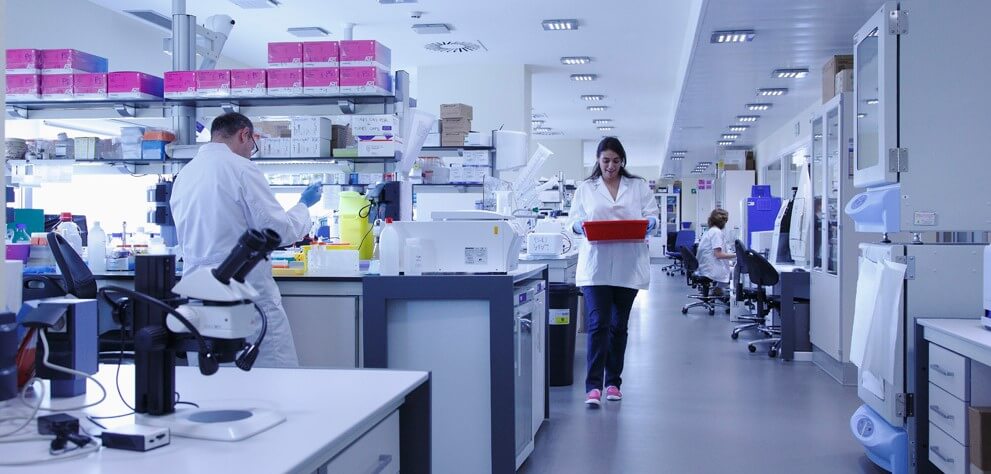
New cell therapy to restore the immune system in cases of multiple sclerosis and neuromyelitis optica
Researchers from Hospital Clínic and the August Pi i Sunyer Biomedical Research Institute (IDIBAPS), in collaboration with four other Spanish research centres, have published a study in the Proceedings of the National Academy of Sciences (PNAS) journal demonstrating the safety of cell therapy based on tolerogenic dendritic cells, with no adverse effects being observed in the treatment of patients suffering from multiple sclerosis (MS) and neuromyelitis optica (NMO). The trial received support from the GAEM Foundation, headquartered in the Barcelona Science Park, and “la Caixa”.
Tolerogenic dendritic cell therapy is a type of therapy which seeks to specifically and selectively alter patient defences to stop the inflammation caused by multiple sclerosis (MS) and neuromyelitis optica (NMO) without altering their other defences. These types of cells, which are taken from patient blood, are modified to inhibit the inflammatory response that is characteristic of these conditions.
The trial published in PNAS — started in late 2015 with 12 participating patients; 8 with MS and 4 with NMO — was coordinated by Pablo Villoslada, director of the IDIBAPS Multiple Sclerosis Pathogenesis and New Therapies group of the Universidad de Barcelona, and Daniel Benítez, physician of the Immunotherapy Unit of the Immunology Department at Hospital Clínic-IDIBAPS. Verifying the safety of the treatment and the absence of moderate and severe adverse effects were the trial objectives.
“The results of this phase 1 study prove that the treatment is safe at the tested doses. We have tested its effect on the immune system, and the results allow us to proceed with clinical trials”, explained Pablo Villoslada.
The clinical trial also showed that this cell therapy can activate a part of the immune system that is responsible for stopping inflammation, thus making it possible to halt the brain damage caused by these conditions.
“We observed that the dendritic cells produced in the laboratory have a ‘tolerogenic’, or anti-inflammatory, profile; in other words, they serve by inhibiting inflammatory response, which is the objective of the treatment. Specifically, we noticed how the treatment induces the production of regulatory white blood cells (referred to as Tr1), which could restore natural immune tolerance. It is yet to be determined whether or not the changes observed in the immune response of the treated patients lead to an improved clinical course”, explained Daniel Benítez.
Two inflammatory conditions that affect the nervous system
Multiple sclerosis is a chronic and inflammatory nervous system condition that destroys the protective substance of nerve fibres, myelin. It is the second most common cause of neurological disability in young adults (between the ages of 20 and 40), affecting women more than men.
The inflammation occurring during flare-ups of this condition causes transient episodes of a loss of strength, sensitivity or vision. However, over time, MS becomes a degenerative condition with a progressive increase in sequelae. The symptoms vary from person to person, with the clinical course being determined by the damaged area. “To date, there aren’t any therapies that are capable of completely curing this disease. Current treatments, which have several adverse effects, are only partially effective, primarily in the early phases”, explained Pablo Villoslada, the study coordinator.
Neuromyelitis optica, meanwhile, a rare condition of the nervous system, is also of inflammatory origin. This condition is characterised by flare-ups that can cause blindness or paraplegia. It is less common but more severe than multiple sclerosis, because it causes more significant sequelae.
Cell therapy in the treatment of multiple sclerosis and neuromyelitis optica
Tolerogenic dendritic cell therapy entails the isolation and maturation of dendritic cells (a type of white blood cell) in a laboratory, making them tolerant to the proteins found in myelin and the brain against which the patient’s immune system reacts. Targeted maturation makes these cells inhibit rather than boost the inflammation. Given that the cells are autologous (taken from the patient), they are not rejected by the body and can execute their function after being administered by injection.
The researchers said that not only does the application of this type of therapy constitute a huge step forward for multiple sclerosis and neuromyelitis optica, but it is also hoped that it could be applied in other autoimmune and rheumatological diseases in the future, such as autoimmune encephalitis, rheumatoid arthritis and psoriasis.
► Reference Article: Irati Zubizarreta, Georgina Flórez-Grau, Gemma Vila, Raquel Cabezón, Carolina España, Magi Andorra, Albert Saiz, Sara Llufriu, María Sepúlveda, Núria Solà-Valls, Elena H. Martínez-Lapiscina, Irene Pulido-Valdeolivas, Bonaventura Casanova, Marisa Martínez Ginés, Nieves Téllez, Celia Oreja-Guevara, Marta Español, Esteve Trias, Joan Cid, Manel Juan, Miquel Lozano, Yolanda Blanco, Lawrence Steinman, Daniel Benítez-Ribas y Pablo Villoslada. ‘Immune tolerance in multiple sclerosis and neuromyelitis optica with peptide-loaded tolerogenic dendritic cells in a phase 1b trial’. PNAS, 8 April 2019.




